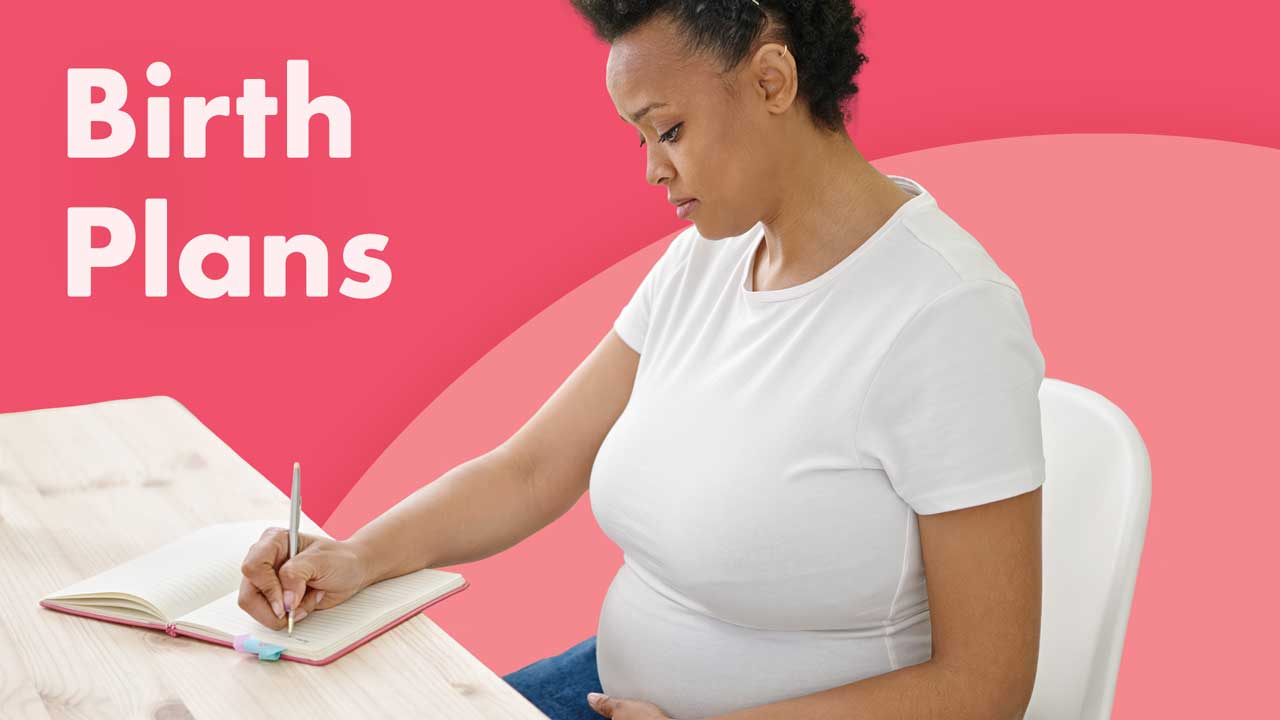Birth plans have become a popular way of helping patients express their choices during labour and delivery, yet they are not universally welcomed.
On the one hand, they can be a valuable tool to guide caregivers in supporting a patient’s choices, but on the other, they may also lead to unrealistic expectations and disappointment with the birthing experience.
So, is the use of birth plans supported by current research? And if so, what information should a birth plan contain?
What is a Birth Plan?
Many patients choose to create a formal plan to help improve their birthing experience. Birth plans are easy to write, and instructions on what to include can easily be found on the internet, in pregnancy books or in some antenatal clinics. Typically, a birth plan might contain some or all of the following information:
- Basic contact details of the patient, including the names of any assigned carers; where the birth is booked to take place; and the names of any chosen birth companions
- Preferences during labour, such as the use of a birthing pool or the wish to walk around freely
- Cultural or religious beliefs the parents may wish to be respected
- The atmosphere the patient wishes to give birth in, for example, a quiet room with dimmed lights
- Preferred methods of analgesia during labour, for example, if an epidural has been requested in advance, or if there is a wish to avoid certain types of pain control
- Delivery preferences, for example, the wish to avoid an episiotomy unless medically necessary, the use of a mirror to see the baby’s birth, a request for the non-birthing parent to cut the cord, or placing the baby on the patient’s abdomen immediately after delivery
- If a caesarean birth is needed, who should accompany the patient into theatre
- Instructions for infant care and feeding. For example, the patient’s views on breast and bottle feeding may be noted along with any instructions about using pacifiers.
Once written, it’s common for the patient to keep a personal copy of the birth plan, with another copy kept in their hospital notes for reference.
Are Standardised Birth Plans of Value?
Whilst all of these decisions can be made as the need arises, creating a birth plan does have the advantage of helping couples plan for their ideal birth experience. However, as Anderson et al. (2017) note, hospital staff have varied opinions about how useful they are, with some who support their use and others who suggest that they set unrealistic expectations for an unpredictable process.
Supporters of birth plans claim they give more autonomy to patients in labour and increase involvement in decision-making, which can help raise overall satisfaction with the birthing experience. It’s an important consideration - when patients are left out of decision-making, a six-fold decrease in satisfaction is reported amongst nulliparous patients and a 15-fold decrease in satisfaction is reported among multiparous patients (Anderson et al. 2017).

Birth Plans Aren’t Universally Accepted
For many patients, birth plans can be a valuable tool to enhance education and communication, but for others, they may result in feelings of disappointment or dissatisfaction if their plan cannot be implemented as they wish (Aragon et al. 2013).
Anderson et al. (2017) also raise concerns about the length and complexity of many birth plans. Online templates can be many pages long, which can discourage carers from closely reviewing the document.
Online birth plans may not address what is, or is not, available at a particular hospital, which may lead to unrealistic expectations and disappointment. Many online birth plans also suggest specific wording to avoid any medical interventions, for example, ‘unless absolutely or medically necessary’. This can potentially cause conflict between patients and their midwives, who may feel that they are unable to make any recommendations for interventions unless they are indeed medically necessary. These concerns are echoed by Afshar et al. (2019), among others, who suggest that over 66% of providers don’t recommend the use of birth plans, and 31% feel that they are predictors of poor obstetric outcomes.
Grant et al. (2010) also suggest that patients with birth plans tend to have worse obstetric outcomes overall compared to those who discuss their preferences with their midwife at the time of delivery. Statistically significant differences have also been reported between healthcare providers and patients in terms of their perceptions of birth plans. In other words, there seems to be a large disparity between the views of pregnant patients and those of their carers regarding the benefits of birth planning.
The Divide Between Carers and Parents
Recognising that there may be conflicting beliefs about what constitutes safe, effective care, and ethical issues related to informed consent and informed refusal, Lothian (2006) suggests that birth plans should aim to answer three simple patient-focused questions:
- What will I do to stay confident and feel safe?
- What will I do to find comfort in response to my contractions?
- Who will support me through labour, and what will I need from them?
(Lothian 2006)
With such a disparity between views, there is obviously a need for further research to clarify if satisfaction, trust and communication scores would be higher or lower if a birth plan is not used. Yet, as Anderson et al. (2017) point out, feelings of satisfaction are difficult to measure as they are far more likely to be related to the delivery itself rather than the use of a birth plan.
Perhaps, as Hidalgo-Lopezosa et al. (2017) suggest, part of the reason why birth plans are not viewed entirely positively is that they tend to have a low degree of compliance. It’s a problem that leads many researchers such as Mirghafourvand et al. (2019) to conclude that there is simply not enough evidence to either support or refute that planning can improve the birth experience.
From Birth Plans to Birth Partnerships

Given that birth plans aren’t always welcomed and may risk increasing disappointment in a less than ideal birth, DeBaets (2017) suggests that creating a birth partnership rather than a birth plan may be more successful. It represents a move away from the tick-box approach and towards a deeper partnership between a patient and their midwife or obstetric team. In an ideal situation, both parties would take the time to discuss in advance the values of the patient and the choices to be made during labour.
Taking the time to build mutual trust can raise patient satisfaction and help avoid potential conflicts, and it’s also true that building a close relationship between midwife and patient is at the heart of midwifery care.
Yet, when face-to-face antenatal time is scarce and there is limited opportunity to build a true birthing partnership, birth plans may still have an important role to play in giving patients greater autonomy over how they give birth.
Topics
References
- Afshar, Y, Mei, J, Fahey, J & Gregory, K 2019, 'Birth Plans and Childbirth Education: What Are Provider Attitudes, Beliefs, and Practices?', The Journal of Perinatal Education, vol. 28 no. 1, viewed 3 October 2023, https://connect.springerpub.com/content/sgrjpe/28/1/10
- Anderson, C, Monardo, R, Soon, R, Lum, J, Tschann, M & Kaneshiro, B 2017, 'Patient Communication, Satisfaction, and Trust Before and After Use of a Standardized Birth Plan', Hawaii J Med Public Health., vol. 76 no. 11, viewed 3 October 2023, https://www.ncbi.nlm.nih.gov/pmc/articles/PMC5694973/
- Aragon, M, Chhoa, E, Dayan, R, Kluftinger, A, Lohn, Z & Buhler, K 2013, 'Perspectives of Expectant Women and Health Care Providers on Birth Plans', Journal of Obstetrics and Gynaecology Canada, vol. 35 no. 11, viewed 3 October 2023, https://www.jogc.com/article/S1701-2163(15)30785-4/fulltext
- DeBaets, A 2017, 'From Birth Plan to Birth Partnership: Enhancing Communication in Childbirth', American Journal of Obstetrics and Gynecology, vol. 216 no. 1, viewed 3 October 2023, https://www.ajog.org/article/S0002-9378(16)30808-0/fulltext
- Grant, R, Sueda, A & Kaneshiro, B 2010, 'Expert Opinion vs. Patient Perception of Obstetrical Outcomes in Laboring Women With Birth Plans', J Reprod Med., vol. 55 no. 1-2, viewed 3 October 2023, https://pubmed.ncbi.nlm.nih.gov/20337205/
- Hidalgo-Lopezosa, P, Hidalgo-Maestre, M & Rodríguez-Borrego, M 2017, 'Birth Plan Compliance and its Relation to Maternal and Neonatal Outcomes', Revista Latino-Americana de Enfermagem, vol. 25 no. 0, viewed 3 October 2023, https://pubmed.ncbi.nlm.nih.gov/29236838/
- Lothian, J 2006, 'Birth Plans: The Good, the Bad, and the Future', Journal of Obstetric, Gynecologic & Neonatal Nursing, vol. 35 no. 2, viewed 3 October 2023, https://www.jognn.org/article/S0884-2175(15)34351-3/fulltext
- Mirghafourvand, M, Mohammad Alizadeh Charandabi, S, Ghanbari‐Homayi, S, Jahangiry, L, Nahaee, J & Hadian, T 2019, ‘Effect of Birth Plans on Childbirth Experience: A Systematic Review', International Journal of Nursing Practice, vol. 25 no. 4, viewed 3 October 2023, https://onlinelibrary.wiley.com/doi/abs/10.1111/ijn.12722

